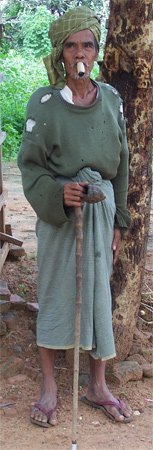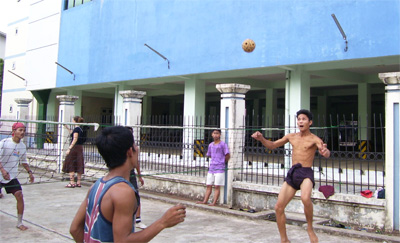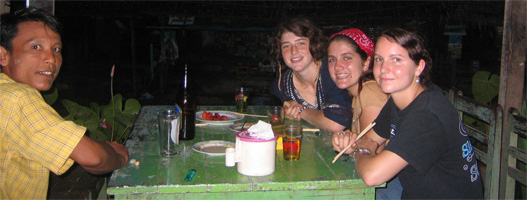Semester at Sea Fall
2006 Voyage 
- Home
Sweet Home
- And Now
Introducing...
- Multisited Ethnography Project
- A
Shipboard Interview
- Japan:
The Wisdom of a Soggy
Monk
- Hong
Kong: Looking for a Scam
- Vietnam:
Vietnamese Pie-Plate
to the Face
- Burma:
"Ok. Ok. No Problem." Androgyny in
Old Bagan
- India:
Traveler's Schizophrenia
- Egypt
vs. Turkey: Brains over
Beauty
- Croatia:
An Obscure
Conversation between an American Girl and a Croatian Forest
- Spain:
An Olive Offer Changed
My Life
- Open Letter
“Ok. Ok. No Problem.”
Androgyny in
Old Bagan
 To
To
Well, what am I then?
I understand the difference between my gender role and
that of the
Burmese women, but what was my sex in the eyes of my Burmese friend,
Aung Kyaw
Min? I asked him for verification that
it was acceptable for me to be kicking and flopping about like a
tap-dancing
flamingo, and he assured me, “OK. OK. No
problem.” It became clear throughout my
travels that Western women come parading into
The lens fit the
vision of the Burmese men vis-à-vis their interactions with my
travel
companions and I: He grabbed her
breast, continuously, as if merely tapping on her shoulder to get her
attention
in passing conversation. He didn’t even
flinch. First time: Hmm…awkward,
but maybe he doesn’t realize where his hands are.
Second time: More awkward – an annoyance this
time. He must not understand.
She
better tell him. Third time…fourth
time…fifth, sixth: Alright. He
must not have heard her. She just removes
his hand for him. That’ll do.
Another clutch: It’s my turn to verbalize
her discomfort. Communication failure. Anger finally boiled up into motion; at the
next hand-to-chest contact she shot up and disappeared into the crowd
of the
Pagoda Festival.
 We
found her, and
he found us. He wanted an explanation;
he had no understanding of what had just transpired.
As we were tootling on back toward our beds
via rickety rental bicycles, Win Aung dispensed his polemical confusion. I gave him an anatomy lesson on respect –
exhibiting areas of a woman’s body that are not meant to be touched in
conversation. He was dumbstruck. His explanation was as follows: “OK. OK. No problem. This
is not problem for me. I
know it is OK. I am not a bad man. It is her [the violated’s] problem.” Within the confines of a language barrier, I
told him that it is a problem when
someone asks you to stop – no matter how comfortable you are or
confused you
are at the request – and you do not abide by such wishes.
She was uncomfortable and made it clear in
all available ways, bottom line. He did
not understand. Our compromise was a
tearful apology on his part, and we let him safely escort us to our
guesthouse
to pacify his woes.
We
found her, and
he found us. He wanted an explanation;
he had no understanding of what had just transpired.
As we were tootling on back toward our beds
via rickety rental bicycles, Win Aung dispensed his polemical confusion. I gave him an anatomy lesson on respect –
exhibiting areas of a woman’s body that are not meant to be touched in
conversation. He was dumbstruck. His explanation was as follows: “OK. OK. No problem. This
is not problem for me. I
know it is OK. I am not a bad man. It is her [the violated’s] problem.” Within the confines of a language barrier, I
told him that it is a problem when
someone asks you to stop – no matter how comfortable you are or
confused you
are at the request – and you do not abide by such wishes.
She was uncomfortable and made it clear in
all available ways, bottom line. He did
not understand. Our compromise was a
tearful apology on his part, and we let him safely escort us to our
guesthouse
to pacify his woes.
Her comfort zone
had been breached, under any context. Any
physical contact between unmarried Burmese men and women is rare. But, the boundaries between Burmese men
overlap as concentric circles versus the male-to-male reserve held in
our own culture. In
What is our role
as women wanderers? To place realistic
trust in the people with whom we have a rare opportunity to make
connections. Safety. To
